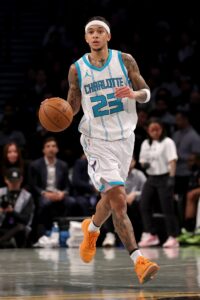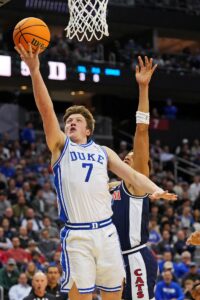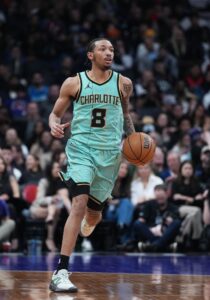Hoops Rumors is checking in on the 2025 offseason for all 30 NBA teams, recapping the summer’s free agent signings, trades, draft picks, departures, and more. We’ll take a look at each team’s offseason moves and consider what might still be coming before the regular season begins. Today, we’re focusing on the Charlotte Hornets.
Free agent signings
 Tre Mann: Three years, $24,000,000. Third-year team option. Includes back-related injury protection. Re-signed using Bird rights.
Tre Mann: Three years, $24,000,000. Third-year team option. Includes back-related injury protection. Re-signed using Bird rights.- Spencer Dinwiddie: One year, minimum salary. Signed using minimum salary exception.
- Mason Plumlee: One year, minimum salary. Signed using minimum salary exception.
- Terrell Brown: One year, minimum salary. Non-guaranteed (Exhibit 10). Signed using minimum salary exception.
- Marcus Garrett: One year, minimum salary. Non-guaranteed (Exhibit 10). Signed using minimum salary exception.
- Keyontae Johnson: One year, minimum salary. Non-guaranteed (Exhibit 10). Signed using minimum salary exception.
- Isaih Moore: One year, minimum salary. Non-guaranteed (Exhibit 10). Signed using minimum salary exception.
- DJ Rodman: One year, minimum salary. Non-guaranteed (Exhibit 10). Signed using minimum salary exception.
- Brandon Slater: One year, minimum salary. Non-guaranteed (Exhibit 10). Signed using minimum salary exception.
Trades
- Acquired Collin Sexton and either the Jazz’s or Clippers’ 2030 second-round pick (whichever is most favorable) from the Jazz in exchange for Jusuf Nurkic.
- Acquired Vasilije Micic, the draft rights to Liam McNeeley (No. 29 pick), and either the Timberwolves’ (top-five protected), Cavaliers’, or Jazz’s 2029 first-round pick (whichever is least favorable) from the Suns in exchange for Mark Williams and the Suns’ 2029 second-round pick.
- Acquired Pat Connaughton, the Bucks’ 2031 second-round pick, and the Bucks’ 2032 second-round pick from the Bucks in exchange for Vasilije Micic.
Draft picks
- 1-4: Kon Knueppel
- Signed to rookie scale contract (four years, $45,487,013).
- 1-29: Liam McNeeley
- Signed to rookie scale contract (four years, $14,194,138).
- 2-33: Sion James
- Signed to four-year, $9,968,963 contract. First two years guaranteed. Third year non-guaranteed. Fourth-year team option.
- 2-34: Ryan Kalkbrenner
- Signed to four-year, $9,968,963 contract. First two years guaranteed. Third year non-guaranteed. Fourth-year team option.
Two-way signings
- Drew Peterson
- One year, $85,300 partial guarantee.
- Antonio Reeves
- One year, $85,300 partial guarantee.
Note: The Hornets carried over KJ Simpson on a two-way contract from 2024/25.
Departed/unsigned free agents
- Seth Curry (unsigned)
- Taj Gibson (unsigned)
- Wendell Moore Jr. (unsigned)
Other roster moves
- Waived DaQuan Jeffries (non-guaranteed contract).
- Waived Josh Okogie (non-guaranteed contract).
- Waived Damion Baugh (two-way contract).
Salary cap situation
- Operating over the cap ($154.6MM) and below the luxury tax line ($187.9MM).
- Carrying approximately $171.5MM in salary.
- Hard-capped at $195,945,000.
The offseason so far
Since taking over as the Hornets’ president of basketball operations in March of 2024, Jeff Peterson has shown little urgency to accelerate the team’s rebuilding process. Charlotte, which last appeared in the playoffs in 2016, has the NBA’s longest active postseason drought and hasn’t won a playoff series since returning to the league as an expansion team in 2004, but Peterson and his front office are showing patience as they attempt to build the roster into one capable of sustained success.
That philosophy was evident again this summer. The Hornets entered the offseason with a pretty favorable cap situation and could have used their full mid-level exception on a free agent addition while remaining comfortably below the luxury tax line. However, the front office instead focused on building through the draft and accumulating draft assets on the trade market, while the club’s only forays into free agency involved re-signing its own players or bringing in minimum-salary veterans.
 Let’s start with the draft, where the Hornets made four picks in the top 34 and subsequently signed all four players to standard contracts. With the No. 4 overall selection, Charlotte took the relatively safe route by adding Duke sharpshooter Kon Knueppel. The one-and-done wing should have a high floor as a pro, but his ceiling is probably quite a bit lower than that of Ace Bailey, who fell to Utah at No. 5.
Let’s start with the draft, where the Hornets made four picks in the top 34 and subsequently signed all four players to standard contracts. With the No. 4 overall selection, Charlotte took the relatively safe route by adding Duke sharpshooter Kon Knueppel. The one-and-done wing should have a high floor as a pro, but his ceiling is probably quite a bit lower than that of Ace Bailey, who fell to Utah at No. 5.
There’s a case to be made that the Hornets should have rolled the dice on Bailey, the player with greater star potential, but they didn’t get a chance to visit with or work out the former Rutgers standout, who was believed to be trying to steer his way to Washington at No. 6. With incumbent cornerstones LaMelo Ball and Brandon Miller coming off injury-shortened seasons, the Hornets decided to prioritize stability over a higher-risk, higher-reward option. And while Knueppel may not become a superstar, he absolutely has the chance to become one of the NBA’s very best shooters while holding his own on defense.
With the 29th, 33rd, and 34th overall picks, Charlotte drafted UConn’s Liam McNeeley, Knueppel’s former Duke teammate Sion James, and Creighton big man Ryan Kalkbrenner, respectively. Once again, the Hornets took a more conservative approach with these picks — McNeeley had been projected by draft experts to come off the board much earlier in the first round, so he was a solid value at No. 29, while James and Kalkbrenner were five-year college players who have had plenty of time to hone their games and could be ready to contribute at the NBA level right away.
Kalkbrenner, in particular, could have an immediate path to rotation minutes in a fairly thin Charlotte frontcourt. James will likely have to rely on his defense to earn him playing time, while McNeeley will have to get back on track after a poor shooting performance in his only college season. Playing alongside Ball and/or Tre Mann should benefit McNeeley in a major way after he spent his freshman year on a Huskies team that operated without a true point guard.
The Hornets acquired the pick they used on McNeeley as part of a trade sending Mark Williams to Phoenix. It was actually the second time the front office had agreed to trade Williams — a deal with the Lakers at last season’s trade deadline fell through due to concerns about his physical. Whether the Hornets share those concerns about the big man’ long-term health or whether they just weren’t especially bullish about his long-term upside, it was clear he was no longer part of their future plans.
Taking into account a subsequent trade involving Vasilije Micic, who was sent from Phoenix to Charlotte in the Williams deal and then flipped to Milwaukee, the Hornets’ total haul for Williams consisted of McNeeley, Pat Connaughton, a 2029 first-round pick, and a future second-round pick (they gave up a second-rounder in the Suns trade but got two back in their deal with the Bucks).
Given that the first-rounder includes “least favorable” language and seems likely to land in the 20s, the return might not be as strong as the package Charlotte nearly acquired from the Lakers at the trade deadline (Dalton Knecht, a future unprotected first-rounder, and a first-round swap). But if McNeeley can develop into a reliable rotation player, it should end up looking fine for the Hornets, who would have had to pay Williams on his second contract beginning in 2026 if they’d hung onto him.
The Hornets’ other offseason trade wasn’t as significant as the one involving Williams, but it was curious for a couple reasons. For one, I’m not sure how Charlotte managed to extract a second-round pick from Utah while swapping Jusuf Nurkic for Collin Sexton, given that both players are on nearly identical expiring contracts and Nurkic – who is older than Sexton by five years – saw his playing time and production fall off last season. That was good work by the front office.
On the other hand, the Hornets’ backcourt is far more crowded than its center spot, so the trade wasn’t an obvious fit from a depth chart perspective. But with Ball and Mann both coming off injuries, acquiring another guard who can handle the ball made some amount of sense for Charlotte.
Speaking of Mann, even though he was limited to just 13 games last season due to a back injury, he was rewarded in free agency with a three-year, $24MM contract. The deal includes a third-year team option and some injury protection for the Hornets in the event that same back issue resurfaces, but it’s still a nice payday for Mann, who was productive (12.6 PPG, 4.5 APG, .446/.377/.797 shooting) in 41 games for Charlotte across parts of two seasons before being sidelined.
The Hornets brought in some additional depth at the point and in the middle by signing free agents Spencer Dinwiddie and Mason Plumlee to minimum-salary contracts. Neither Dinwiddie nor Plumlee is likely to play a starring role in Charlotte, but they’re reliable veterans who can give the team 15-20 minutes per night if needed.
Up next
 Even after waiving DaQuan Jeffries earlier this month, the Hornets have a bit of a roster crunch to deal with before the regular season begins, with 16 players on guaranteed contracts and Moussa Diabate (on a non-guaranteed contract) looking likely to make the roster.
Even after waiving DaQuan Jeffries earlier this month, the Hornets have a bit of a roster crunch to deal with before the regular season begins, with 16 players on guaranteed contracts and Moussa Diabate (on a non-guaranteed contract) looking likely to make the roster.
If Charlotte chooses to simply waive two players in order to set its 15-man regular season roster, Connaughton and former first-round pick Nick Smith Jr. look like the odd men out to me.
Diabate’s non-guaranteed contract would normally make him an obvious release candidate, but he gave the team good minutes last season and could even have a path to a starting role this fall, with just Kalkbrenner and Plumlee as his primary competition at center. Dinwiddie and Plumlee are on small expiring contracts, but probably wouldn’t have been given guaranteed salaries two months ago if the plan was to waive either of them.
If the Hornets want to hang onto Connaughton’s expiring contract for midseason trade purposes or if they liked what they saw from Smith down the stretch last season, maybe they try to make a trade to open up a spot to keep one of them. But most teams won’t be looking to shake up their rosters during the preseason, and there are only so many legitimate trade candidates on the Hornets’ roster. Josh Green and Grant Williams could be a couple to watch.
Green and Williams are two of the Hornets’ players eligible for contract extensions, along with Sexton and Connaughton, but I’d be surprised if the team completes any extensions before the season tips off. The front office likely wants to keep its cap sheet relatively clean going forward, and none of those four players are obvious long-term keepers for the organization.
